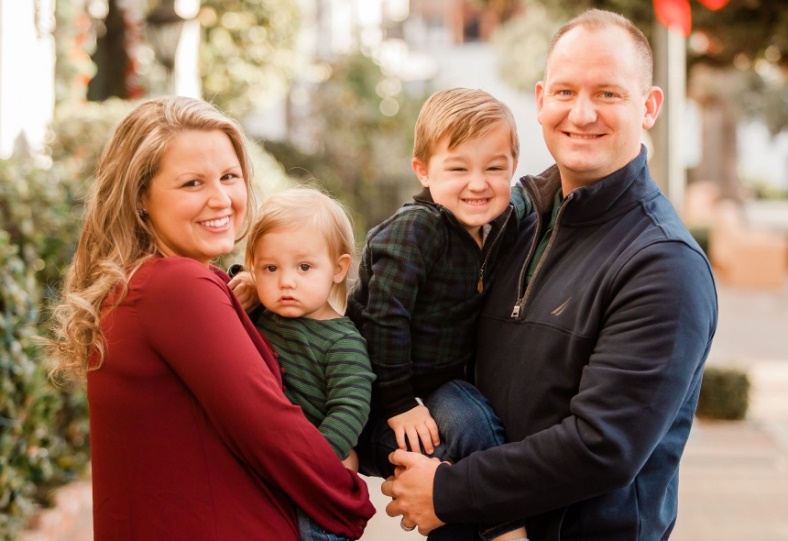Military spouses are the ultimate efficient managers. But they’ve been constantly passed over for jobs. Michelle Penczak’s Company Squared Away changed all that and became a $5 million business.
“I never thought I’d be a CEO. I had planned to go to law school right after college,” says Michelle Penczak, 34, in her genial North Carolina voice. She’s having a typical day in her San Diego home, which translates to: extremely busy and extremely organized. She is the owner of an almost-four-year-old company, Squared Away, that has a team of 190 military spouses, all women, working as virtual assistants of every kind — scheduling and travel planning; marketing and social media management; time optimization; much more — for over 400 businesses and individuals in the U.S. and six other countries. Squared Away recently reported an annual recurring revenue base of $5 million and took in $500,000 in revenue in April alone. Still, Penczak takes care of her two children, including a son recently diagnosed with autism, without any help. “I’m Mom and primary caregiver, juggling it all.”

Her husband, Sean, a Marine Corps pilot, leaves home daily to go to the base and will soon be deployed to a far-off location while she stays at home with the kids. She gets up, takes two-year-old Jamison and five-year-old Sawyer to school, and “then I come home at 8:30 to check in with my team and then jump on calls and work on email till noon, break for thirty minutes to an hour and pick up my boys at three p.m., get them situated, and then keep going: checking in with my director of operations, my director of client relations, my director of client connections, and my director of finance.”
During this time the virtual assistants on her team are all helping one another via Slack. “There could be fifty conversations going on at the same time” among them, trading tips, she says. It’s that intense, proactive community-mindedness — characteristic of military spouses to begin with — that is one of the things that made Penczak’s company take off so fast and successfully.
Like many a strong start-up, Squared Away was born out of a mix of competence, frustration, and necessity.
First, competence: “Military spouses are very resilient — we have a lot of grit,” Penczak says. “We persevere. A lot of times we don’t have the option to quit — we move to different areas all the time and just have to figure it out right away: new schools, new houses, new neighborhoods, new everything. We utilize our resources and think outside the box.”
Second, there was frustration — and no small amount of unfairness — in the mix. When many of these super-competent women applied for jobs in their new locations, they didn’t get them — and Penczak was one of them. When she was about to move with her then-new husband from Texas to North Carolina in early 2013, the experienced administrative assistant applied for 80 jobs and went to about 25 interviews. “They would all go really well, but then they would ask me what brought me to the area, and I inevitably told them my husband was a Marine Corps pilot. It was like a light switch went on as soon as they heard I was a military spouse; they assumed I would be moving around a lot. They would essentially say, ‘We’ll be in touch,’ and the jobs never came through.
“My friends were like, ‘It’s not surprising. The only places that want to hire military spouses are restaurants and coffee shops, because they know we’re essentially disposable employees.’ There was a sense that there was nothing we could do about it.
“It was incredibly depressing because I’m extremely proud of my husband. But, aside from being a wife and mom and holding it all together, I wanted a career and felt I should be equal to other job applicants — held to the same standard as everybody else.”
Penczak and her friends’ frustrations reflected the national reality. A February 2021 Department of Defense survey found that military spouses had a 22 percent unemployment rate and a 26 percent wage gap, next to their civilian counterparts. One professional services company called the under- and unemployment of military spouses “staggering.”
In the summer of 2013 Penczak started working as a remote assistant with the company Zirtual; soon she was promoted to manager, and by 2015 “I had five clients who were located all over the place.” Soon the company went bankrupt, Penczak became pregnant with her first son, and Sean got orders that he would be deployed to Hawaii. “That was literally the moment when I thought, ‘I have to do something new! I’m not gonna let this beat me! I’m going to take my clients with me and start working with them virtually.’”
She did so with seven clients, getting up at 3 a.m. Hawaii time to be able to service those on the east coast. One of her clients, Shane Mac, who had a technology business, said, “My company is growing. I want you to grow with me. I wish you could clone yourself. I need a bunch of assistants just like you.” An idea was born; she immediately replied, “We’re going to do that with military spouses!”
“But the groundwork was mine. And the name Squared Away was mine. As a Marine, my husband always walked around saying, ‘I’ve got to get things squared away.’” The phrase fit.
Penczak launched the company on Veterans Day 2017, and it grew — astonishingly, both on the assistants’ side and on the clients’ side — by social media and word of mouth. “It blows my mind how fast it happened,” she says, “but if people passed my strict application process, they were on-boarded fast. I’d say, ‘If you can get through the application then I guarantee you’re strong enough to work with a CEO.’”
Kelsey Opel, the wife of a Marine, was one of Squared Away’s first virtual assistants. “I went to over 25 different locations…before landing the job with Michelle. I was elated to regain my identity as a working professional. I anticipated that we would continue to stay a small team. I cannot believe that we have reached the point where we are employing over 190 military spouses less than four years later!” she says. Opel’s favorite part of Squared Away is the proactive community. She says, “Our team rallies around each other through the ups and downs, the wins and losses. I will never forget the camaraderie we experienced when Covid hit. We all leaned in hard and didn’t hold back in supporting one another across the globe; we gave advice on how we were wrangling our kiddos while managing Zoom calls and hitting deadlines. And then we’d reconvene and talk about how it went.”
Penczak adds, “Last year, during the pandemic, one of our assistants — who has four kids — lost her husband and we all rallied around her to make sure she and her family were supported.”
The community of assistants is valuable to the clients, too. Says Adrian Granzella Larssen, who runs an editorial services provider called Sweet Spot Content, “What’s amazing is the broader Squared Away network. When my assistant can benefit from additional insight on something, she has a pool of other assistants she can reach out to. This is a group of people for whom the traditional work model doesn’t work. They’re smart, ambitious, sometimes college-degreed professionals who want a great job, but they can’t get hired because employers are nervous about hiring someone who might move after a year or two. It’s a massive pool of talent that has, historically, been underutilized.”
Another business owner, who didn’t want her name used, says, “I set out to find a virtual assistant when I had just launched my own business, and it turned out to be very much like dating. I tested five services before I found Michelle and Squared Away.” The other services were expensive, and “the assistants often had so many clients it was hard to feel like you weren’t a line item in a multi-tasking spreadsheet. And sometimes you didn’t even have a point person, which made you feel like screaming into the void whenever you needed help with your account.”
Squared Away, she found, emphasizes quality over quantity; each assistant has a maximum of four clients. “Every time I hear Michelle’s story I am inspired. To be able to support a female founder with such a tremendous mission, it’s just amazing,” she says.
Still, the military spouse unemployment rate remains “stubbornly” higher than the regular American unemployment rate.
Penczak says, “I would love to change those numbers for military spouses because their grit and tenacity and thinking outside the box are near and dear to my heart. But I’d also like to use business owners’ happiness with our workers to get them to see the value in other ‘unconventional’ applicants : people with autism”— like her son — “and other disabilities. To see how we can become a team and partner together.
“That is my ideal.”
Featured image: courtesy Michelle Penczak
Become a Saturday Evening Post member and enjoy unlimited access. Subscribe now



